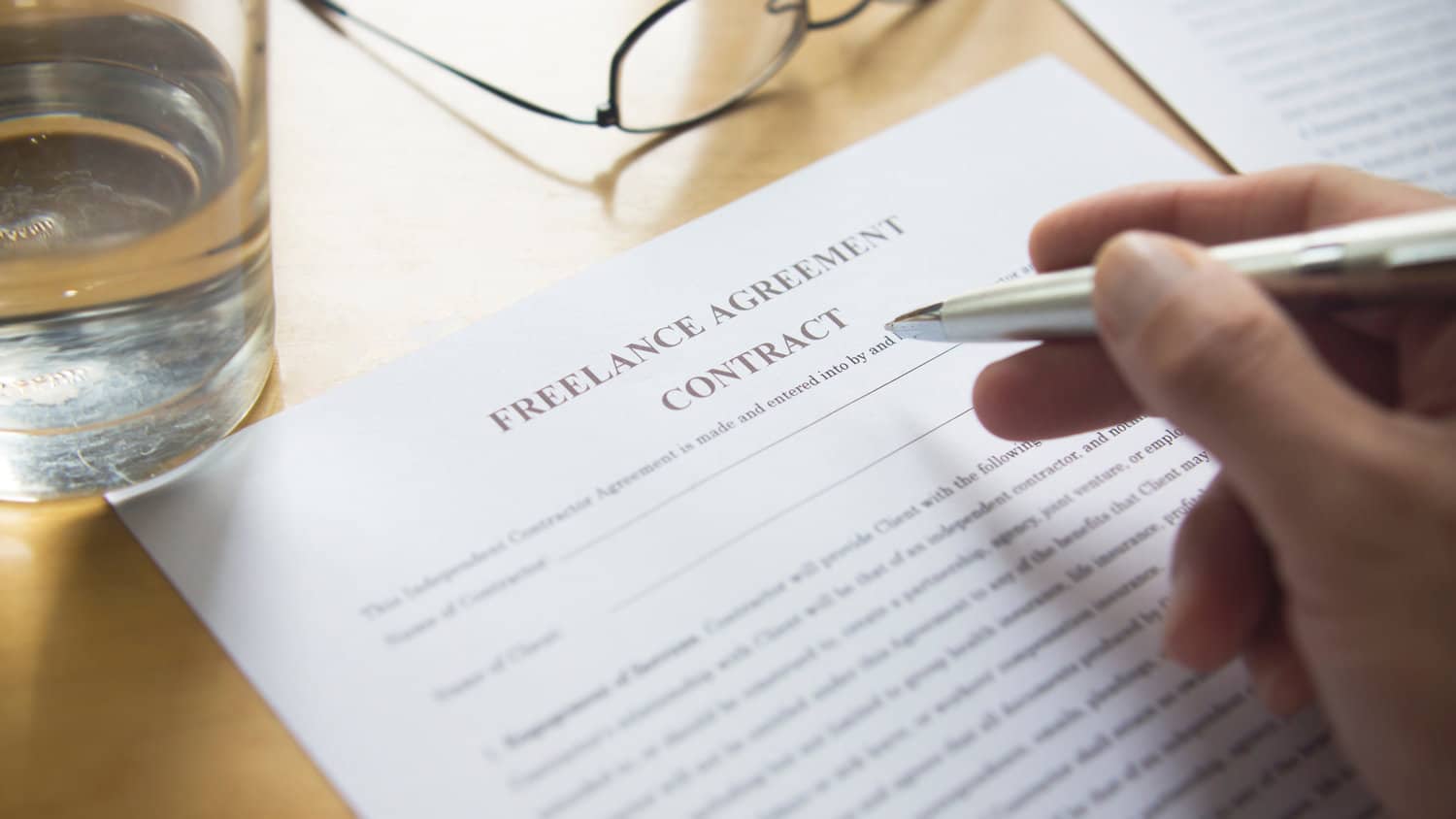Jasmine Birtles
Your money-making expert. Financial journalist, TV and radio personality.


If you’re just starting out working for yourself, it can be difficult to know what should go in your first freelance contract. How should you specify terms? Will including them put the client off? What are the key things that you should include?
There are no hard and fast rules with this. There are best practices, though, that you should expect from clients as well as from yourself. It’s important to protect yourself, after all. If you don’t you could end up being taken advantage of. That’s something that we want to help you avoid at all costs!
So, what are the key things that you should include in a freelance contract? Here are the main ones…

When you agree to any freelance work, you must have an agreement in writing. It saves a lot of headaches down the line! However, some clients will want to use their version of a freelance agreement instead of yours.
When it comes to the terms of your agreement, you might find that they conflict with those of the client. This is a difficult situation, but it’s where your negotiation skills come in.
Of course, the ideal situation is them signing your terms with no questions asked. You should push to get them to accept your terms. This will be easier if you’re a limited company and/or have extensive experience though, so be aware that you might need to be at least a little bit flexible.
Don’t be too willing to compromise, though. Be aware of your red lines: how much you’re willing to compromise on, whether it’s over your payment terms, day rate or the extent of the research that you’ll be expected to do. Don’t agree to anything that falls below the mark!
If your terms are vastly different to theirs, there might not be a happy compromise that you can land on. If this is the case, it’s likely that it’s time for you to walk away. It’s unlikely that, with unreasonable terms, this client would have respected you or your work anyway.
It’s not unusual for clients to request you sign a non-disclosure agreement (NDA) alongside their contract (or yours). Read the details carefully – it’s usually a case of “you won’t contact the customer directly; you can’t use the work in your portfolio; you can’t discuss the work outside our agreement”. This is all fairly standard, but check for hidden clauses. For example, if there’s a non-compete clause that means you can’t work for similar clients (because they’re worried you’ll share intellectual property), don’t sign. It can seriously limit your future work opportunities and even open you to lawsuits!
Do you need payment in advance, so that you can gather materials in order to research or to complete the work? Will you be paid in 30, 60 or 90 days from the date of the invoice? If it’s a big piece of work, how will the client pay you – will the payments be split up? Should you expect a direct bank transfer, or to be paid along with the staff payroll?
All of these things are important, and you need to make sure they’re decided upon before you see an initial freelance contract so that they can be included from the get go. If you’re not clear on the details, you run the risk of not being paid in a timely fashion. Don’t be afraid to go back with requested alterations to your contract if the terms are unfair, or are different to what you discussed.
A general rule of thumb is to always set at least SOME advance payment before you start the work. At least 25% is a good starting point: it shows commitment from the client and makes sure they’re serious about paying you. It also means you’ll be set up on payroll systems at the start – making it much easier to chase your next invoices!
It’s vital to have a project outline included in any type of freelance contract. What is the exact scope of the work that you’ll be expected to do? Having this laid out from the start avoids what the industry terms “scope creep” – where clients will add on extra work, under the guise that they expected you to do it in the first place or that it was part of the initial agreement. The phrase “Can you just…” is a clear sign of imminent scope creep!
Scope creep is in no way OK, and you should protect yourself against it. Be clear about what your service is going to provide, and what won’t be included as well as what will. If the client wants additions later, they can book more work with you at your set price.
Being clear on this will give the client greater oversight of what you’re working on at every stage, too. Remember, the contract protects them and the money they’re investing as well as offering protection for you!

This is especially key if you’re working on a big project, or one that’s going to take you a few months to complete. If there are different stages to the work, and different pieces to be submitted and signed off by the client, you should be clear on when each part is expected.
Even if it’s a smaller project (for example a single article commission), you should have a set date that the editor expects to see the first draft. Note that in this situation, you might not always have a formal freelance contract that you sign. Instead, your terms will likely be agreed to over email. As long as your agreement is in writing, it counts as a legal contract!
You should make sure time for edits or revisions are factored into the timescales that you agree upon, too. How many revisions will you be willing to make at each stage, before you need to start billing for extra time spent? This is likely to be two or three, within the scope of the original brief (you shouldn’t be expected to make huge changes, or for the original brief to be changed once it’s been agreed upon.)
How long will each revision take? Set this out in the freelance contract, so that everyone is clear from the start: 48 hours for minor revisions, for example, and longer for more extensive ones. Of course, the nature and time spent on the revisions that you make will entirely depend on your industry and the scope of the work that you’re doing.
Ask who your point of contact is for edits, too. There’s nothing worse than ‘sign off by committee’ when you have half a dozen people putting their thoughts to you. It often conflicts with other comments, and gets very confusing. Set one point of contact responsible for collating feedback from your client – this makes it a much simpler process for everyone!
Finally, lay out how much extra time costs, too. Make sure this hourly rate is not too low: you want clients to stick to your agreed project. If they don’t, you need to get paid fairly for extra work!
Another essential thing to think about, but one that might easily end up being forgotten, is: who actually owns the work that I’m doing? In most cases, this is likely to be the company or client that you’re working for. It’s good to get it confirmed in writing to avoid any confusion, though. You might also want to think about second rights – i.e, would you be allowed to sell the work on in the future? If so, would the original client expect a cut? Get your details ironed out in your initial contract, and you’ll avoid confusion later on.
Do you have any advice to offer on drawing up freelance contracts? We’d love to hear about your experience. Let us know over on the freelance forum.
Check out these articles next for more tips about setting up and running your freelance venture!

Contracts can be rather complicated so all the help is appreciated.